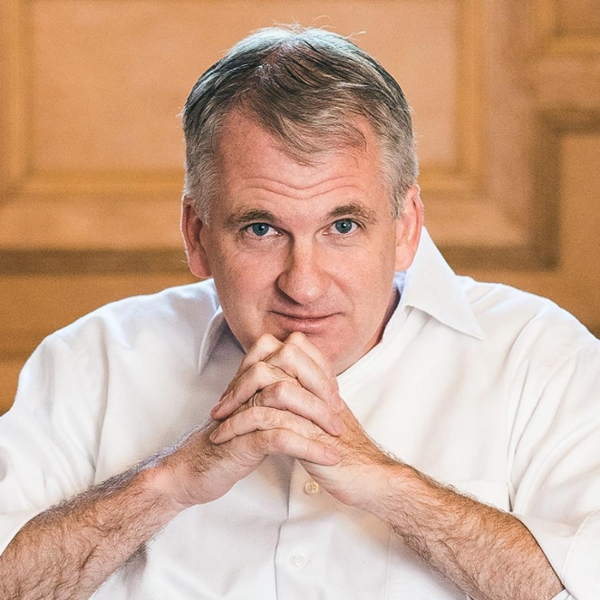Yale’s Timothy Snyder Discusses the State of Our Democracy
By Tom PorterDemocracy should not be taken for granted, and defending it sometimes takes courage. These were some of the observations shared by noted historian Timothy Snyder in a webinar on February 18.

The event, moderated by Associate Professor of History Page Herrlinger and viewed by around 450 participants, was the first in a series of discussions on the state of American democracy organized in the wake of the January 6 attack on the Capitol. The series is called "After the Insurrection: Conversations on Democracy."
Snyder is the Richard C. Levin Professor of History at Yale University and a permanent fellow at the Institute for Human Sciences in Vienna. He specializes in the history of fascism in twentieth-century Europe. He is the author of On Tyranny, described by The Washington Post as “a slim book that fits alongside your pocket Constitution and feels only slightly less vital.” Snyder also recently published an essay in The New York Times titled "The American Abyss" about the sources and meanings of the January 6 insurrection.
Before taking questions from the online audience, Snyder shared his views on the Capitol attack, the reasons for it, and what it means for American society. He divided his presentation into five segments. Here is a summary of his comments, featuring some edited quotes:
- The COVID-19 Pandemic
Snyder said it was important not to overlook the pandemic when assessing the factors behind January 6. “I do think we have to keep in mind the fact that the United States had been in a terrible state of health for the previous year and that this itself, and the falsehoods told around it, along with the controversies that it caused, had something to do with the mood by early 2021.”
- Race
In connection with the events of January 6, and what it means for democracy, Snyder said one crucial question to consider is: Who is represented in a democracy? Since the 1870s, he explained, there’s been basically one US political party that has served as the voter suppression party. It was initially the Democrats, he continued, but for the past fifty or sixty years it has been the Republican Party, for whom politics has been reduced to a game in which “you’re less and less interested in policy, and more interested in the kind of ideology or rhetoric that keeps you in power.” This attitude toward “gaming the system,” he added, represents an attempt to decrease the voices of nonwhite voters.
- The Big Lie
This feeds into the idea of what Snyder calls “The Big Lie.” Donald Trump’s big lie, he said, is that he won the election, and this is identical to the “American Big Lie” which propagates the falsehood that “Black people are not really people, they don’t count.” Trump’s big lie is based on the notion that many of the votes that went against him, which were nonwhite votes in urban areas, are not valid. Snyder admits that all politicians lie (“controlled mendacity is part of the reality of politics”), but most lies “don’t have the quality that if they were true, they would change the whole world. Big lies do this.” Accepting Trump’s big lie, said Snyder, means swallowing an entire conspiracy-based world view that unjustly views America’s democratic institutions with mistrust. If enough major politicians continue to believe that big lie, Snyder said, he would have grave concerns for the future of American democracy.
- Mob Rule
The idea of “mob rule,” where disgruntled citizens take the law into their hands and act violently to achieve their aims, is concerning to Snyder for two reasons. First, he said, for the obvious reason that it goes against the principles of democracy, where we trust in our institutions and abide by the rule of law. This trust clearly broke down on January 6. Snyder is also worried by what he called the rule of mob rule, which asserts that “our representatives are only our representatives because they’re afraid of us.” Snyder said this principle was on display in the way many GOP lawmakers voted after the Capitol attack, upholding the views of Trump and opposing his impeachment. “We know that a number of Republican representatives and senators voted how they did because they're afraid of the violence of their own electorate. That's the wrong reaction, because that's giving into mob rule.” It is, he explained, “inviting violence in as the final determinant of our politics.”
- The Future
Snyder warned against the complacency of believing that, because the January 6 coup attempt failed, American democratic institutions can be trusted to hold up against future attempts. “That's not the right reaction. If you get this close, if you really have armed people and bombs in your parliament, if you really have a president who's trying to overturn the election, you can't say the institutions work. What you have to say is ‘how can we improve those institutions?’” To be successful, Snyder concluded, a democracy needs structural support. “One of those structures it needs is health care; another is support of factuality.” Also, from time to time, a democracy needs to show a little bit of courage to succeed.
Watch the event:



